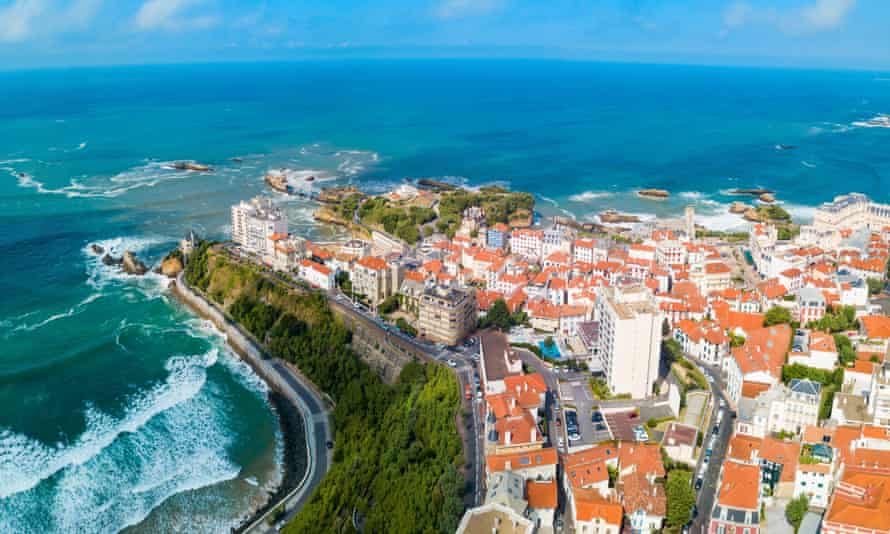Basque landlords are told they must rent out homes for entire year
||| FROM THE GUARDIAN REPRINT AT REQUEST OF ORCASONIAN READER |||
With its elegant boutiques and stretches of golden sand, the French resort of Biarritz has long proved a popular holiday destination. Wealthier visitors have flocked to the Hôtel du Palais, while another crowd comes for the surf and heads inland for stunning mountain hikes.
Yet as tourism has boomed, local residents have increasingly struggled to find somewhere to live. The reason, say campaign groups, is holiday homes. The number of holiday lets across the French Basque country has more than doubled to 16,500 between 2016 and 2020. Private rental accommodation is scarce and there is almost a two-year wait for social housing.
Local officials this month passed tough new rules to block the development of Airbnb and holiday lets in 24 towns and villages across the region, including in Biarritz.
From June, landlords who want to let a second home for holiday stays will need to provide an equivalent property to rent for the whole year in the same town or village. As many landlords will struggle to find and fund a third property that matches the requirements, advocates hope the new rules will bring thousands of flats back on to the rental market.

Tough new rules have blocked the development of airbnb in Biarritz. Photograph: Andrey Khrobostov/Alamy
Maider Arosteguy, the mayor of Biarritz, described the current situation as “untenable”. At the vote, she raised the case of a couple going through a separation but forced to remain in the same accommodation despite incidences of domestic violence. She said officials had to “find solutions to enable young people and those on average incomes to stay and live in the Basque country”.
The move may help people such as Charlotte Belot, a 27-year-old environmental campaigner. “When I finished my degree, it was impossible to find somewhere to live,” she said. “So I moved back in with my parents. I later found a shared house where the contract ended each June so the landlord could turn it into a tourist flat for the summer.
“I was lucky enough to be able to go home again, but some of my housemates had to rent Airbnbs for two months at summer prices as they had nowhere else to go. Finding a place here is really hard.”
**If you are reading theOrcasonian for free, thank your fellow islanders. If you would like to support theOrcasonian CLICK HERE to set your modestly-priced, voluntary subscription. Otherwise, no worries; we’re happy to share with you.**









“…advocates hope the new rules will bring thousands of flats back onto the rental market.” Unfortunately, it has been shown that accommodations like these “flats” will NOT return to the long-term rental market, but will either be kept unrented so that the owners can use them as their own second homes, or sold at non-“affordable” prices.
At any rate, The Orcasonian continues to show their misguided bias against vacation rental owners. Maybe The Orcasonian will use a little logical reasoning and recognize that using VRs as the scapegoat for problems of over-tourism and lack of affordable housing only vilifies good local people.
Let’s keep in mind that SJC currently has between 4-7% of our housing being used as vacation rentals (it’s hard to be sure exactly how many, as 200 are currently being phased out). Many of these areas such as Basque and ski towns in Colorado have between 35-65% of their housing in vacation rentals. We are not even close to that dire level yet.
This is why many of us support caps, but NOT the strict caps that the Planning Commission is currently recommending.
The last paragraph of this article states: “Questions remain too over the prospect of landlords simply removing their holiday lets and putting the properties up for sale. “In that case, they would again be out of reach for those who want to live and work here,” said Belot. “So this new measure is not enough, but it’s a start.”
Vacation Rentals are not the only cause of high housing costs. Eliminating VRs will not lower the price of housing in our community or suddenly make affordable rentals available. It would only mean more vacant homes that their owners use occasionally, and allow their friends and family to use (without the guidelines that our VRs must follow, or the taxes that our VRs must collect for SJC use).